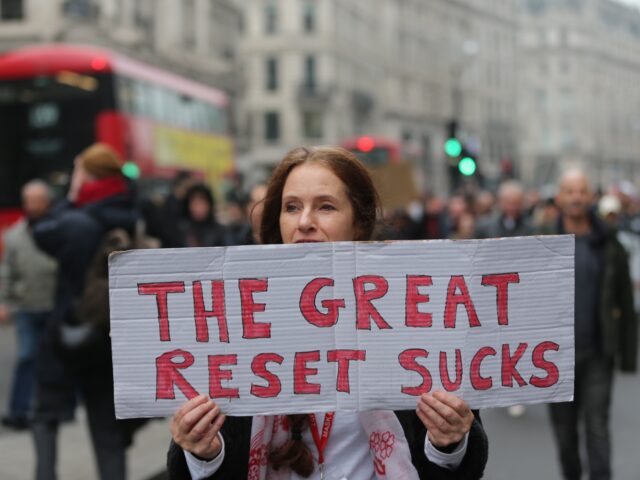The decisions by governments around the world to engage in massive spending sprees and money printing during the Chinese coronavirus crisis is the central cause for persistent inflation, a leading central banker has admitted.
The head of the Swiss-based Bank for International Settlements (BIS), Agustin Carstens has acknowledged that governments and central banks throughout the world were to blame for the current economic hardships felt by working and middle-class people through inflationary policies such as governments giving massive handouts to businesses and workers to stay home during the lockdowns and central bankers engaging in quantitative easing schemes to generate more currency.
“While understandable as the Covid crisis broke out, with the benefit of hindsight, it is now clear that the fiscal and monetary policy support was too large, too broad-based and too long-lasting,” the central banker said in comments reported by London’s Daily Telegraph.
Carsten went on to say that problems were exacerbated by central banks keeping interest rates at artificially low levels following the 2008 financial crisis, saying: “Low rates as far as the eye could see encouraged further debt expansion, public and private.
“Moving forward, policy needs to be more realistic in its ambitions and more symmetrical over the business cycle. Buffers used in downturns must be rebuilt in recoveries. Unrealistic expectations that have emerged since the great financial crisis and Covid-19 pandemic about the degree and persistence of monetary and fiscal support need to be corrected.”
‘Global Policy Failure’: Lockdowns Had ‘Negligible’ Impact on Deaths Compared to ‘Staggering Collateral Costs’, Study Finds https://t.co/HZqlpsZLlk
— Breitbart London (@BreitbartLondon) June 8, 2023
The comments from the head of the Bank for International Settlements seemingly contradict previous claims from the Bank of England, which asserted in May that the notion that quantitative easing was a cause of the rampant inflation “is not well supported”.
The Bank of England has come under heavy criticism of late, raising interest rates to 5 per cent in a desperate attempt to quell inflation, which still remains at 8.7 per cent — far above the BoE’s target of 2 per cent. This comes despite the governor of the central bank, Andrew Bailey, claiming in 2021 that the spikes in the cost of goods would be a “temporary” phenomenon.
Last week, Brexit leader Nigel Farage called on the government to sack Bailey for his “economic incompetence”, saying: “Andrew Bailey didn’t see inflation coming when it started he said it was transitory, he didn’t put rates up. And because of that our inflation rate is now higher than that in Europe and in America.
“Now rates are going to soar and anyone with borrowings is going to pay the price. This bloke is a total incompetent. We needed a Brexiteer as governor of the Bank of England, someone who believed in making us competitive.
“He is no good, it’s time he was sacked, it’s time Rishi to ditch the dud.”
People Need to ‘Accept’ Being Poorer Amid Inflation, Says Central Banker https://t.co/bCKs4a4Thv
— Breitbart London (@BreitbartLondon) April 27, 2023
Prime Minister Rishi Sunak, a former Goldman Sachs banker who by some estimates is wealthier than King Charles III, has increasingly come under criticism for his handling of the economy as well.
Sweeping into power — against the expressed will of Conservative Party members — in September of last year in a globalist Westminster coup that ousted short-termed PM Liz Truss, Sunak promised to keep taxes at a seventy-year high to tackle the inflation crisis and to pay off the debt accumulated during his tenure as Treasury chief during the Chinese coronavirus lockdowns.
Yet, neither of these plans has materialised, with debt climbing to £2,567.2 billion ($3,2687,200,000,000) or in other terms 100.1 per cent of GDP, the first time that public debt has surpassed GDP since 1961.
As for inflation, which still sits at nearly nine per cent, a poll last week from YouGov found that 82 per cent of voters believed the government was performing poorly in reducing inflation, an increase of six points since May.
A Treasury spokesman said: “We will not hesitate in our resolve to support the Bank of England as it seeks to squeeze inflation out of our economy.
“We rightly spent billions to protect families and businesses from the worst impacts of the pandemic. But we won’t leave future generations with a tab they cannot repay so we have taken difficult decisions to balance the books and get debt falling.”
Rishi Sunak Pledges to Cut Inflation and Stop Illegal Migrants… Eventuallyhttps://t.co/htllbtwalu
— Breitbart London (@BreitbartLondon) January 4, 2023

COMMENTS
Please let us know if you're having issues with commenting.